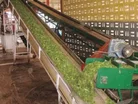Tea tastes even better thanks to training scheme

A training scheme to improve the quality of tea harvested in Rwanda has been initiated in a bid to ensure crops reach the best possible price at both national and international markets.
Spearheaded by the National Agriculture Export Development Board (NAEB), the scheme has trained more than 1,200 tea farmers in harvesting standards.
Francis Twagirayezu, NAEB’s representative in Mombasa, said: “Rwandan tea, especially the liquor type, is always the best at the Mombasa auction. However, traders always complain that they find foreign materials in the tea. With the skills gained we hope the problem will cease.”
Tea production in Rwanda currently comprises of 11 tea factories and six tea projects with an annual production volume of more than 23,000 metric tons of dry tea.
The area under tea cultivation is approximately 15,000 hectares and since 1995 tea production has grown from 5,414 tons to 23,249 tons in 2010.
Rwanda produces one of the best quality teas in the world with about 97.3 percent exported in raw form, 60 percent is sold at auction, 37.3 percent is sold directly and 2.7 percent is sold locally.
About 100 trainees were selected from each of the 11 tea factories and in Mulindi, more than 200 tea farmers were trained.
Twagirayezu said: “Improving farmers’ skills will not only boost their incomes but also promote sustainable farming methods.
“I’m optimistic that once farmers master the standards, Rwandan tea can cost as much as $6 per kilogramme at auction.”
Currently, primary grades of tea fetch between $2.9 and $5 per kilogramme at the Mombasa auction.
Other steps to help improve tea quality are for processors to meet with tea brokers from the Mombasa auction so they can discuss the challenges the industry faces in improving its quality.
About 70 percent of the tea sold at the Mombasa auction is traditionally exported to Egypt, Pakistan, UK, Sudan and Afghanistan.
However, countries including Russia, China, the USA, Turkey, Iran and the UAE are also increasingly interested in purchasing Rwandan tea, which is another reason for improving its quality.



